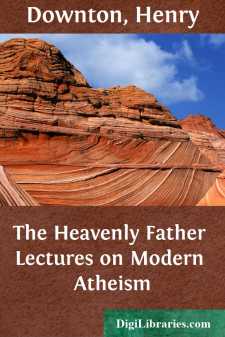Categories
- Antiques & Collectibles 13
- Architecture 36
- Art 48
- Bibles 22
- Biography & Autobiography 813
- Body, Mind & Spirit 142
- Business & Economics 28
- Children's Books 17
- Children's Fiction 14
- Computers 4
- Cooking 94
- Crafts & Hobbies 4
- Drama 346
- Education 46
- Family & Relationships 57
- Fiction 11829
- Games 19
- Gardening 17
- Health & Fitness 34
- History 1377
- House & Home 1
- Humor 147
- Juvenile Fiction 1873
- Juvenile Nonfiction 202
- Language Arts & Disciplines 88
- Law 16
- Literary Collections 686
- Literary Criticism 179
- Mathematics 13
- Medical 41
- Music 40
- Nature 179
- Non-Classifiable 1768
- Performing Arts 7
- Periodicals 1453
- Philosophy 64
- Photography 2
- Poetry 896
- Political Science 203
- Psychology 42
- Reference 154
- Religion 513
- Science 126
- Self-Help 84
- Social Science 81
- Sports & Recreation 34
- Study Aids 3
- Technology & Engineering 59
- Transportation 23
- Travel 463
- True Crime 29
The Heavenly Father Lectures on Modern Atheism
by: Henry Downton
Description:
Excerpt
LECTURE I.
OUR IDEA OF GOD.
(At Geneva, 17th Nov. 1863.—At Lausanne, 11th Jan. 1864.)
Gentlemen,
Some five-and-twenty or thirty years ago, a German writer published a piece of verse which began in this way: "Our hearts are oppressed with the emotions of a pious sadness, at the thought of the ancient Jehovah who is preparing to die." The verses were a dirge upon the death of the living God; and the author, like a well educated son of the nineteenth century, bestowed a few poetic tears upon the obsequies of the Eternal.
I was young when these strange words met my eyes, and they produced in me a kind of painful bewilderment, which has, I think, for ever engraven them in my memory. Since then, I have had occasion to learn by many tokens that this fact was not at all an exceptional one, but that men of influence, famous schools, important tendencies of the modern mind, are agreed in proclaiming that the time of religion is over, of religion in all its forms, of religion in the largest sense of the word. Beneath the social disturbances of the day, beneath the discussions of science, beneath the anxiety of some and the sadness of others, beneath the ironical and more or less insulting joy of a few, we read at the foundation of many intellectual manifestations of our time these gloomy words: "Henceforth no more God for humanity!" What may well send a shudder of fright through society—more than threatening war, more than possible revolution, more than the plots which may be hatching in the dark against the security of persons or of property—is, the number, the importance, and the extent of the efforts which are making in our days to extinguish in men's souls their faith in the living God.
This fear, Gentlemen, I should wish to communicate to you, but I should wish also to confine it within its just limits. Religion (I take this term in its most general acceptation) is not, as many say that it is, either dead or dying. I want no other proof of this than the pains which so many people are taking to kill it. It is often those who say that it is dead, or falling rapidly into dissolution, who apply themselves to this work. They are too generous, no doubt, to make a violent attack upon a corpse; and it is easy to understand, judging by the intensity of their exertions, that in their own opinion they have something else to do than to give a finishing stroke to the dying.
Present circumstances are serious, not for religion itself, which cannot be imperilled, but for minds which run the risk of losing their balance and their support. Let it be observed, however, that when it is said that we are living in extraordinary times, that we are passing through an unequalled crisis, that the like of what we see was never seen before, and so on, we must always regard conclusions of this nature with distrust. Our personal interest in the circumstances which immediately surround us produces on them for us the magnifying effect of a microscope: and our principal reason for thinking that our epoch is more extraordinary than others, is for the most part that we are living in our own epoch, and have not lived in others. A mind attentive to this fact, and so placed upon its guard against all tendency to exaggeration, will easily perceive that religious thought has in former times passed through shocks as profound and as dangerous as those of which we are witnesses. Still the crisis is a real one. Taking into account its extent in our days, we may say that it is new for the generation to which we belong; and it is worthy of close consideration. To-day, as an introduction to this grave subject, I should wish first to determine as precisely as possible what is our idea of God; to inquire next from what sources we derive it; and lastly to point out, as clearly as I may, the limits and the nature of the discussion to which I invite you....


